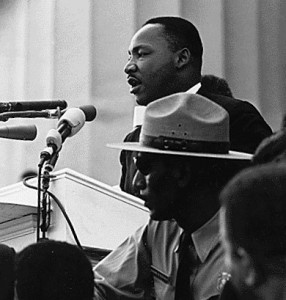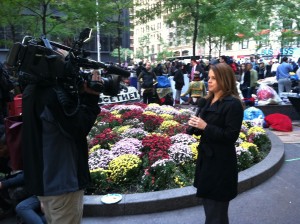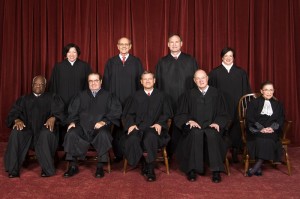Civil Rights
If justice is only an implication, it can easily become optional and, especially in privileged churches, non-existent. In the New Testament, conversion happens in two movements: Repentance and following. Belief and obedience. Salvation and justice. Faith and discipleship.
Atonement-only theology and its churches are in most serious jeopardy of missing the vision of justice at the heart of the kingdom of God. The atonement-only gospel is simply too small, too narrow, too bifurcated, and ultimately too private.
"Where my feminists at?" on #OccupyWallStreet. Test your global hunger knowledge. Race and OWS. Poverty in your backyard. How to be a "1 Percenter." OWS to march on banks. Romney embraces climate change denial. Magicians say their craft makes them see faith as little more than "hocus-pocus." Catholic University sued by Muslim students. And faith, political leaders find out how far food stamps actually go.
 At the dedication ceremony for the Martin Luther King, Jr. Memorial, at least two speakers -- the Rev. Bernice King, Martin Luther King's daughter, and the Rev. Jesse Jackson, one of King's lieutenants -- reminded us that at the end of King's life he was planning the Poor People's March
At the dedication ceremony for the Martin Luther King, Jr. Memorial, at least two speakers -- the Rev. Bernice King, Martin Luther King's daughter, and the Rev. Jesse Jackson, one of King's lieutenants -- reminded us that at the end of King's life he was planning the Poor People's March
The Poor People's March is an ancestor to the current Occupy Wall Street movement that we see breaking out across the globe today. The idea was to bring poor people from across the color line -- white, black, brown, red, yellow -- to Washington to call attention to the importance of economic justice. King understood that economic justice -- distributive justice -- was not a matter of race in the United States.
It was true then, and it is true now that African Americans and Latino/as suffer disproportionately from income inequality. But it is important to remember that people of all colors suffer from the corrosive effects of income inequality. Some of the poorest communities in the country are European American. The poorest states in the United States with some of the worse educational and health care outcomes are states in the former confederacy.
Income inequality has increased since 1968. So the question that insists upon being answer is this: Why has income inequality worsened between 1968 and today?
I had seen people my age start successful businesses, become pop-stars and even play a key role in partisan political campaigns, but I had never seen them develop and sustain a social movement.
Sure there have been more focused shifts around issues like educational equity, LGBT rights or global poverty that my generation has had a hand in shaping, but nothing that quite had the look or the feel of what I imagined the anti-War or Civil Rights movements of the 1960s to have been. I assumed we -- my contemporaries ( I'm 27) -- simply didn't possess the interest or the will-power to accomplish something that big.
I was wrong.
The Rev. Fred Shuttlesworth, a pioneer and giant of the civil rights movement, died Wednesday at 89.
The U.S. Supreme Court is set to begin hearing oral arguments this week in one of the most important church-state cases in decades. In Hosanna-Tabor Church v. Equal Employment Opportunity Commission, the court will consider whether a Lutheran school in Michigan is subject to a federal law banning discrimination based on a disability.
Sojourners has always tried to understand and advocate for "biblical politics." But what does that mean now, especially as we approach another major election?
I was talking the other day to a Christian leader who has given his life to working with the poor. His approach is very grassroots -- he lives in a poor, virtually all-minority community and provides basic services for low-income people. He said, "If you work with and for the poor, you inevitably run into injustice." In other words, poverty isn't caused by accident. There are unjust systems and structures that create and perpetuate poverty and human suffering. And service alone is never enough; working to change both the attitudes and institutional arrangements that cause poverty is required.
The Dream is Freedom: Pauli Murray and American Democratic Faith, by Sarah Azaransky.
The forthcoming dedication of the national memorial monument honoring Rev. Dr. Martin Luther King, Jr., affords an opening for considering the complexity and meaning of his leadership. He was not the tamed and desiccated civil hero as often portrayed in the United States around the time of his birthday, celebrated as a national holiday. He was until the moment of his death raising issues that challenged the conventional wisdom on poverty and racism, but also concerning war and peace.
King was in St. Joseph's Infirmary, Atlanta, for exhaustion and a viral infection when it was reported that he would receive the 1964 Nobel Peace Prize. As Gary M. Pomerantz writes in Where Peachtree Meets Sweet Auburn, this was the apparent cost exacted by intelligence surveillance efforts and the pressures of learning that Attorney General Robert F. Kennedy had formally approved wiretaps by the Federal Bureau of Investigation. His evolving strength as a leader is revealed in his remarks in Norway that December, which linked the nonviolent struggle of the U.S. civil rights movement to the entire planet's need for disarmament.
The rioting and rampages that spread across English cities last week have caused severe property destruction and raised public alarm. Writing in London's Guardian, community organizer Stafford Scott describes how he was among the group that on August 6 sought information from the police in Tottenham, a poorer section of London. They wanted an official statement on whether Mark Duggan had been killed by police bullets, as had been reported in the news.
All we really wanted was an explanation of what was going on. We needed to hear directly from the police. We waited for hours outside the station for a senior officer to speak with the family, in a demonstration led by young women. A woman-only delegation went into the station, as we wanted to ensure that this did not become confrontational. It was when the young women, many with children, decided to call it a day that the atmosphere changed, and guys in the crowd started to voice and then act out their frustrations.
This event is what most media accounts have identified as the spark that set England on fire, which has caught the world by surprise. Yet, says Scott, "If the rioting was a surprise, people weren't looking."
They say at some point in their lives great leaders experience a "dark night of the soul," or a period in life when your feet, knees, and face scrape and stick to the proverbial bottom." It is a time when even your soul feels forsaken. Ultimately, the dark night is not about the suffering that is inflicted from outside oneself, even though that could trigger it. It is about the existential suffering rooted from within. St. John of the Cross, the 16th century Carmelite priest, described it as a confrontation, or a healing and process of purification of what lies within on the journey toward union with God.
"Whenever you face trials of any kind," explained the apostle James, "consider it nothing but joy, because you know that the testing of your faith produces endurance; and let endurance have its full effect, so that you may be mature and complete, lacking in nothing." (James 1:2-4)
Re: Carolyn McKinstry's "From Mourning to Gladness" (May 2011): Birmingham Sunday spurred many African Americans and European Americans to get involved in the civil rights movement.
!['Civil Rights March on Washington, D.C. [Dr. Martin Luther King, Jr., President of the Southern Christian Leadership Conference, and Mathew Ahmann, Executive Director of the National Catholic Conference for Interrracial Justice, in a crowd.], 08/28/1963' photo (c) 1963, The U.S. National Archives - license: http://www.flickr.com/commons/usage/](http://lh3.ggpht.com/-XUAmAA_vWKI/Ti7l4ZavSOI/AAAAAAAACS8/0Y0EfQ03QzA/Flickr-4101511358.jpg) How should music rank among the ever-growing list of time-tested nonviolent methods such as boycotts, marches, strikes, sit-ins, and vigils?
How should music rank among the ever-growing list of time-tested nonviolent methods such as boycotts, marches, strikes, sit-ins, and vigils?
Anthony Shadid of the New York Times reports that a song, "Come on Bashar, Leave," is spreading across Syria, boldly calling on President Bashar al-Assad to step down. (Bryan Farrell also wrote about it at the Waging Nonviolence blog.) The article suggests that a young cement layer who chanted it in demonstrations was pulled from the Orontes River this month, his throat having been cut, and, according to residents of the city of Hama, his vocal chords torn out. Hama is where, in 1982, then-president Hafez al-Assad, father of the current president named in the song, gave orders to the army to massacre more than 10,000 in putting down an Islamist upheaval. Today, boys 6-years-old and older vocalize their own rendition of the original warbler's song instead. As the song has sped across Syria, demonstrators have adopted it for themselves.
Shakespeare said a rose by any other name would smell as sweet. Maybe, but a Stink Rose by any other name (say... garlic?) might get more play.
On July 19, Campus Crusade for Christ announced its plan to officially change its name to Cru in early 2012.
Brown v. Board of Education had not yet been fought in the Supreme Court when Bill and Vonetta Bright christened their evangelical campus-based ministry Campus Crusade for Christ in 1951. The evangelical church context was overwhelmingly white, middle class, and suburban. The nation and the church had not yet been pressed to look its racist past and present in the face. The world had not yet been rocked by the international fall of colonialism, the rise of the Civil Rights movement, the disillusionment of the Vietnam War, the burnt bras of the women's liberation movement, the fall of the Berlin Wall, or the rise of the Black middle class (more African Americans now live in the suburbs than in inner cities). In short, theirs was not the world we live in today. So, the name Campus Crusade for Christ smelled sweet. Over the past 20 years, though, it has become a Stink Rose ... warding off many who might otherwise have come near.
It's funny the things that you remember. I can remember one time when I was a teenager watching an episode of the Montel Williams show. I don't remember the topic, but I do remember Montel criticizing the U.S. government for spending too much money on military defense and not enough on domestic needs. I remember thinking to myself, "That's the stupidest thing I've ever heard." In the world that I knew, the idea of slashing military spending was absolutely, totally, utterly UNTHINKABLE! I personally had never met anyone who thought that way, so I assumed that anyone who would suggest such a thing had to be either a) naive; b) stupid; c) a tree-hugger; or d) unAmerican.
That was then.
I don't know if it's because I changed or because America has changed (or both), but for years it seemed like the only ones who suggested slashing military spending were groups that few Americans could identify with: like hippies, pacifists, environmental and civil rights activists, and conspiracy theorists. Today, the idea that a significant portion of the nation's economic woes is due to wasteful Pentagon spending can be found both on the left and on the right ends of the political spectrum. It can also be found in the Pentagon.
Meet "Mr. Y."
The way you think and feel about the world is shaped by what you see when you get out of bed in the morning. I remember hearing this from civil rights activists. It simply means that perspective is hugely determined by place, context, and vantage point. This is profoundly true for me and most of the people I've ever met. You see the world from the place you live.
Part of the problem in the current budget impasse in Washington, D.C. is the perspectives of the politicians in the debate. Every morning they see and hear each other; the gladiator ring of national politics; the Washington media; their donors; their ideological base; and their latest poll ratings.

